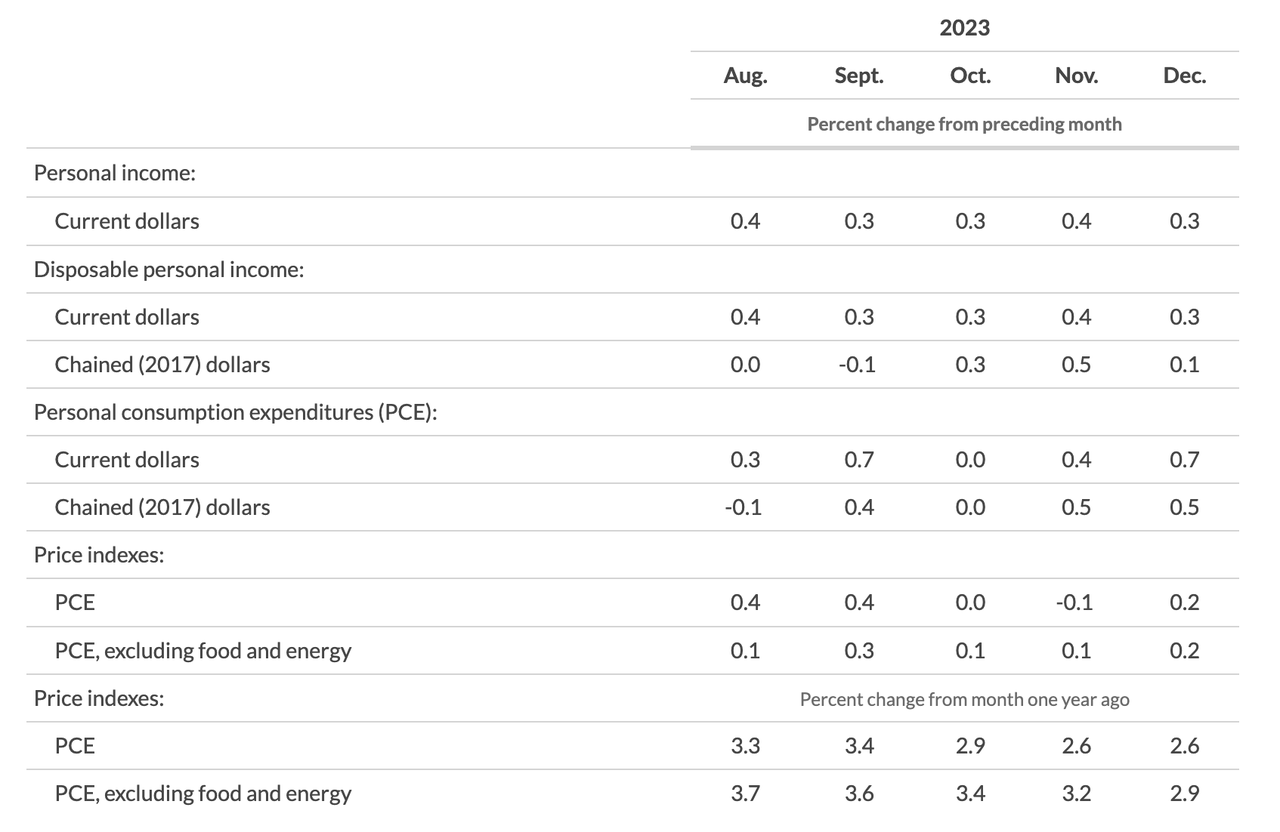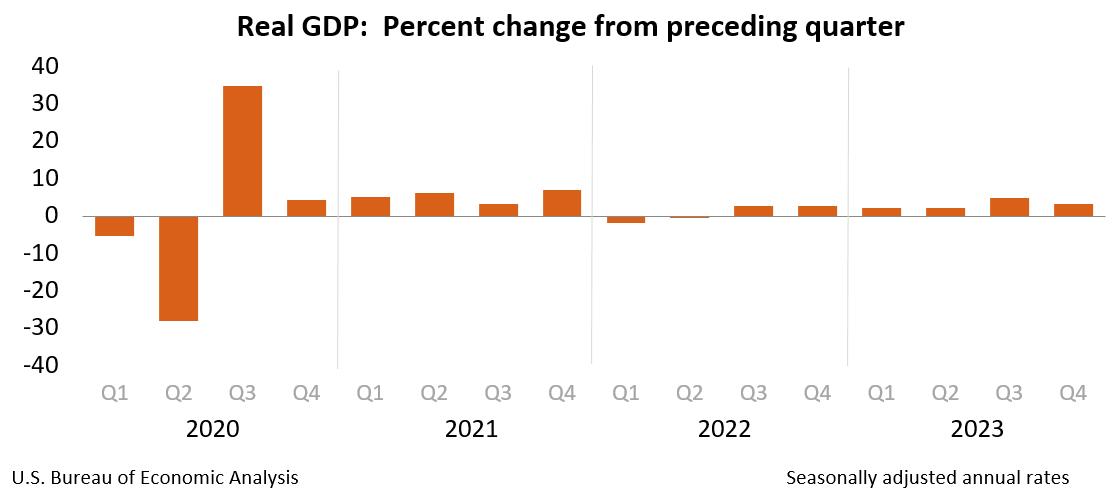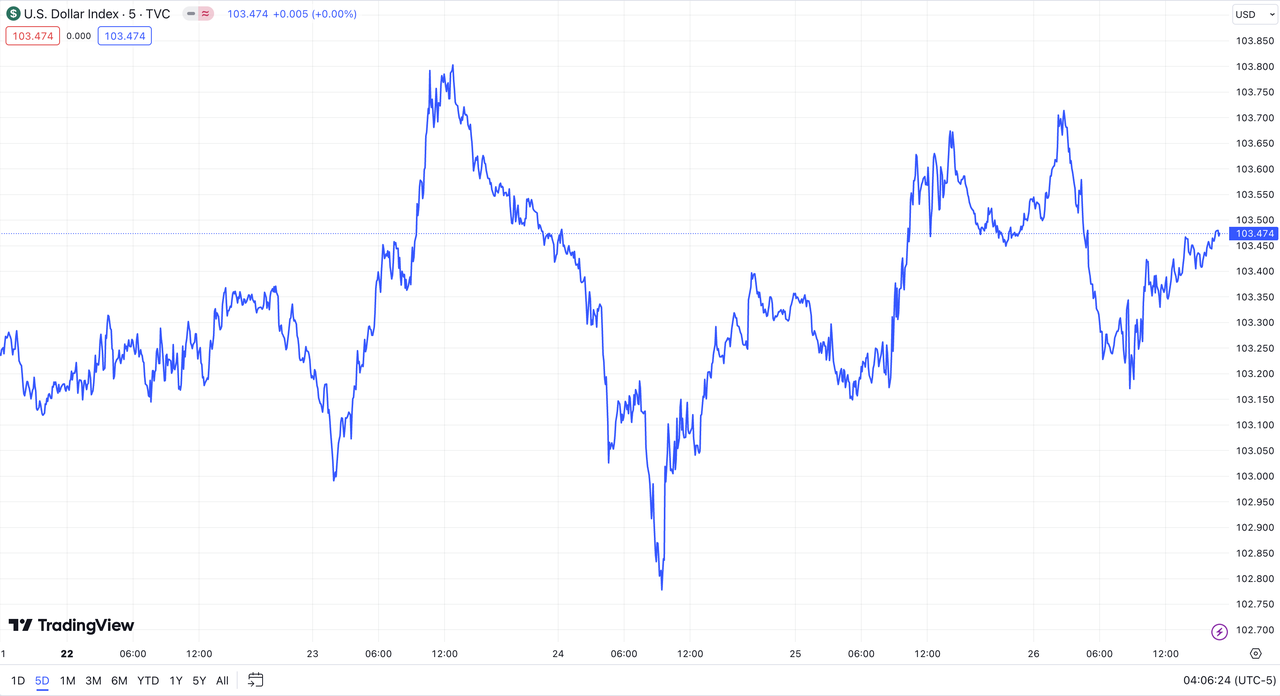The OP Lab announced the launch of a protocol upgrade to enhance the Superchain's event response capabilities
*All on-chain data is dated as of 12:00 a.m. EST on Sunday, January 28th.
Keywords: #GDP #PCE

1 Macro Market Overview
U.S. Stocks Notch Weekly Gains; Major Indexes Sit Near Records. According to WSJ, a rally in big tech stocks has helped propel the S&P 500 to new highs. A belief that the Federal Reserve has successfully slowed inflation without inducing a sharp economic slowdown has helped fuel the trade. The central bank’s preferred inflation gauge showed Friday that price pressures remained mostly subdued in December. The personal-consumption expenditures index rose 0.2% from the previous month. Consumer spending rose 0.7% in December from the previous month, data released Friday showed.
Last Thursday, the Commerce Department said the economy grew at a 3.3% seasonally and inflation-adjusted rate in the fourth quarter. That beat the 2% rate economists surveyed by The Wall Street Journal expected. Growth was 3.1% over the course of 2023, defying expectations for a recession. Meanwhile, the Federal Reserve’s preferred inflation measure stayed steady at 2% in the last three months of the year, a sign that the central bank is taming inflation.
Last week, all three major U.S. stock indices recorded gains, with the technology-heavy Nasdaq Composite Index rising by 1.0%. The Dow Jones Industrial Average and the S&P 500 also saw increases of 0.7% and 1.1%, respectively. Web3-related stocks also exhibited gains, with COIN and MSTR rising by 0.4% and 2.9%, while MARA experienced a notable increase of 10.6%.
Left: Three Indexes, Right: Nasdaq, COIN & MARA & MSTR (Source: Yahoo Finance)
Macro indexes
Personal income increased $60.0 billion (0.3 percent at a monthly rate) in December, according to estimates released last week by the Bureau of Economic Analysis (tables 2 and 3). Disposable personal income (DPI), personal income less personal current taxes, increased $51.8 billion (0.3 percent) and personal consumption expenditures (PCE) increased $133.9 billion (0.7 percent).
The PCE price index increased 0.2 percent. Excluding food and energy, the PCE price index increased 0.2 percent (table 5). Real DPI increased 0.1 percent in December and real PCE increased 0.5 percent; goods increased 1.1 percent and services increased 0.3 percent (tables 3 and 4).
Personal Income and Outlays, December 2023 (Source: Bureau of Economic Analysis)
Real gross domestic product (GDP) increased at an annual rate of 3.3 percent in the fourth quarter of 2023 (table 1), according to the "advance" estimate released by the Bureau of Economic Analysis. In the third quarter, real GDP increased 4.9 percent.
The GDP estimate released last week is based on source data that are incomplete or subject to further revision by the source agency (refer to "Source Data for the Advance Estimate" on page 3). The "second" estimate for the fourth quarter, based on more complete data, will be released on February 28, 2024.
Gross Domestic Product, Fourth Quarter and Year 2023 (Advance Estimate) (Source: Bureau of Economic Analysis)
Last week, the U.S. Dollar Index (DXY) closed at 103.474 on Friday, marking a 0.2% increase compared to the previous week. It reached its weekly high on Tuesday, approaching 103.800 at one point.
DXY (Source: TradingView)
According to data from the Chicago Mercantile Exchange (CME) Group, interest rate futures indicate that currently, close to 50% of investors believe that the Federal Reserve might cut interest rates at its March meeting. This data remains relatively stable compared to the levels observed last week.

Left: EFFR, Right: Target Rate Probabilities for March 2024 Fed Meeting
(Source: Federal Reserve Bank of New York, CME FedWatch Tool)
In bond markets, the yield on the benchmark 10-year Treasury note edged up to 4.159% from 4.131% Thursday. The 10-year U.S. Treasury yield slipped to 4.131% after settling at its highest level since Dec. 12 on Wednesday. Yields fell in part because of weaker than expected labor market data that lifted bond prices.
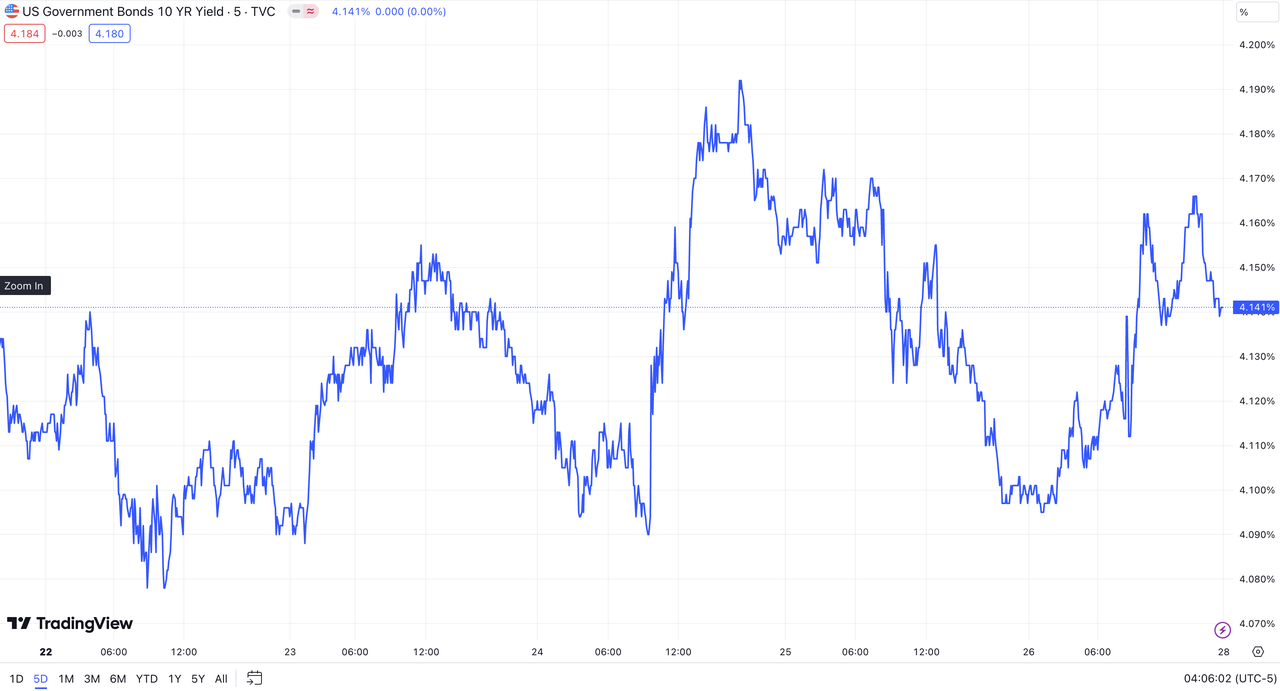
US10Y (Source: TradingView)
Bitcoin spot ETF recorded a total net inflow of 14.81 million USD last Friday, bringing the historical cumulative net inflow to 756 million USD. Excluding Grayscale, other ETFs saw a total net inflow of 269 million USD. Fidelity's Bitcoin spot ETF (FBTC) led in daily net inflows, with approximately 100 million USD, representing 37.17% of the total net inflow. BlackRock's ETF IBIT followed, with a daily net inflow of 87.13 million USD, accounting for 32.3% of the total net inflow. The cumulative net inflow for Bitcoin spot ETFs has now reached 756 million USD. Grayscale's GBTC ETF still holds a net asset value of 20.058 billion USD, with the total net asset value of Bitcoin spot ETFs at 26.74 billion USD.

Left: Bitcoin Spot ETF Overview, Right: Daily Trading Activity of Bitcoin Spot ETF
(Source: Blockworks, SoSo Value)
Roughly ‘60% chance’ of spot ETH ETF approval in May: Seyffart. Spot ether ETFs have roughly a 60% chance of being approved in May, according to Bloomberg Intelligence analyst James Seyffart. Earlier this week, the Securities and Exchange Commission delayed decisions on the potential BlackRock and Grayscale ether ETFs. Alongside BlackRock and Grayscale, Ark 21Shares and VanEck are also in the running for a spot ether ETF. The delays were not surprising, according to experts who expect the SEC to put off a decision on the ETFs until later this year. The SEC, earlier this month, approved a slew of bitcoin ETFs.
2 Crypto Market Pulse
Market Data
Last week, the total market capitalization of the cryptocurrency market remained relatively stable, currently standing at $16.4 trillion. Bitcoin and Ethereum experienced continued retracement in the early part of last week, with prices reaching lows of $38,000 and $2,100, respectively, on Tuesday. This represented a nearly 25% retracement from their highest points in January. As of the early morning of January 28th, the spot price of Bitcoin rebounded to $42,500, marking a 2% increase from the previous week. As the second-largest cryptocurrency, the price of Ethereum declined to $2,287, reflecting a 7% decrease. Additionally, Bitcoin's market capitalization increased by 2% to $836 billion, while Ethereum's market capitalization decreased by 8% to $275 billion.

Left: Market Cap, Right: BTCÐ Price (Data: CoinMarketCap)
$MANTA, $HNT, and $SUI emerged as Top 3 gainers, while $ORDI, $WOO, and $WEMIX were Top 3 losers. Among the top 100 cryptocurrency projects by market capitalization, $MANTA emerged as the top gainer with a weekly increase of over 54%. One of the main reasons for the rise in the price of $MANTA is the sharp increase in Total Value Locked (TVL) during January 2023. According to data from DeFiLlama, $MANTA has entered the top ten TVL blockchains since January. $HNT is a project in the DePIN field, establishing a peer-to-peer wireless network for low-power Internet of Things devices to connect to the internet. The DePIN field is expected to be a major narrative in 2024, as it is deeply intertwined with the real world and has significant disruptive potential. Additionally, the recent rise in $SUI is primarily attributed to two factors: the hosting of the Move Ecosystem Conference and the Sui ecosystem project initiating substantial subsidies. These are also key factors driving the rapid growth of TVL and cross-chain activities.

Top 10 Gainers & Losers (Data: CoinMarketCap, LBank Labs)
Last week, the total supply of stablecoins continued to climb, currently reaching $129.5 billion. Over the past seven days, the net position change in stablecoin supply has consistently remained positive and is increasing, indicating a growing demand from investors in the cryptocurrency market. Furthermore, examining the net position data of stablecoins on exchanges over the past week, the overall trend continues to show a net inflow. This reflects the increase in the total supply of stablecoins on exchanges over the past seven days, indicating a positive outlook for the market's future development.

Stablecoins Market Cap (Data: Glassnode)
In the derivatives market, there was no significant change in the open interest of Bitcoin and Ethereum perpetual contracts. Over the past seven days, the total open interest in the futures market was influenced by the short-term retracement in the prices of Bitcoin and Ethereum, reaching a noticeable low on Tuesday. Liquidation data indicates that the initial retracement in the early part of last week led to a significant number of long positions being liquidated for both Bitcoin and Ethereum. Various data points suggest that the current market is in a retracement phase, characterized by ongoing volatility.

Left: BTC & ETH Open Interest, Right: BTC & ETH Total Futures Liquidations (Data: Glassnode)
In the decentralized finance (DeFi) market, the total locked value (TVL) experienced a decline last week and is currently at $569 billion. Over the past seven days, the trading volume on decentralized exchanges (DEX) decreased to $240 billion, representing a 6% reduction compared to the previous week. The market share gap between decentralized exchanges (DEX) and centralized exchanges (CEX) continues to widen, with DEX now accounting for 9% of the total CEX trading volume. In the past week, due to adjustments in the cryptocurrency market, the TVL of most of the top ten major blockchains has decreased. Sui saw a gain of over 21% in the seven-day period, successfully entering the top ten, while Optimism, following a less favorable performance in the previous week, continued to decline by over 6%.

Left: TVL & Volume, Right: Top 10 chains (Data: DefiLlama)
Last week, the market capitalization of Non-Fungible Tokens (NFTs) experienced a decline, currently standing at $8.7 billion. At the same time, the total trading volume also began to cool down, decreasing by 29% over the past seven days. Additionally, in the top NFT collections, both the floor price and average prices mostly exhibited a downward trend. The floor price of the Bored Ape Yacht Club (BAYC) increased by 1%, while the average price grew by 3%. On the other hand, the floor price of the Mutant Ape Yacht Club (MAYC) decreased by 3%, and the average price dropped by 1%. The Blue Chip Index, calculated by using a weighted market value of a set of blue-chip stocks (ETH/USD), declined from 5133 to 4925.

Market Cap & Volume, 7D (Data: NFTGo)
LBank Labs Recap
BTC's selling pressure has experienced a notable reduction, coinciding with a slowdown in Grayscale's BTC sales. The specific catalyst behind this deceleration remains unclear, leading to speculation that the selling pressure may have originated from FTX, with a substantial portion of their BTC inventory now sold on Coinbase. The recent drop in BTC's price from $44,000 to $39,000 has likely contributed to a disincentive for further selling. Despite this, it's worth noting that the Nine ETFs continue to offer lower fees compared to Grayscale's ETF, suggesting a potential ongoing shift of assets. Currently, the market appears to be favoring assets with the highest liquidity, maintaining a pattern observed previously.
WEN - The emergence of Solana's new meme has generated significant social waves within the community, resulting in increased trading volume on the Solana DEX compared to ETH. Monitoring projects like $WEN and $WIF will be crucial as they gain attention.
ICP - Demonstrating robust performance since the end of last year, ICP has attracted speculation about capital inflows from the Middle East region.
ORDI - Market attention towards ORDI seems to be waning. Both ORDI and SATS are perceived to have valuations that may struggle to attract further buying interest unless there is a broader market uptrend.
ALT - Maintaining a strong momentum, ALT has exhibited the most favorable first five days of price action for a Binance launchpool this year.
MANTA - Similar to ALT, the market maker for MANTA is actively driving up the price, indicating a positive trend in its performance. Continued monitoring of these dynamics will be essential for investors.
• BTC price optimistic: $42500 - $44500
• BTC price neutral: $40500-$42500
• BTC price pessimistic: $39000 - $40500
3 Major Project News
[Ethereum] Ethereum All Core Developers Consensus Call #126 Writeup. According to Christine Kim's summary of the 126th Ethereum 2.0 Consensus Layer Core Developers' Meeting (ACDC), the main topics discussed in this meeting included: The Deneb upgrade proceeding as planned, with Sepolia scheduled for January 30th at 22:51:12 UTC and Holesky for February 7th at 11:34:24 UTC; confirmation of EIPs for the next upgrade, Electra, such as EIP-6110 (on-chain validator deposit provisioning), EIP-7002 (execution layer-triggered exits), and EIP-7549 (removing committee index from attestation); and ongoing discussions about EIPs awaiting further consideration, including EIP-7251 (raising the maximum effective balance from 32 to 2048), EIP-7594 (P2P data availability sampling/PeerDAS), and SSZ-related EIPs. Additionally, there is research underway regarding potential changes to the Ethereum staking reward curve.
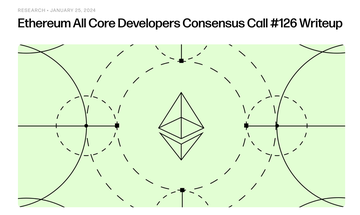
(Source: galaxy.com)
[Layer2] Improving Superchain Incident Response Capabilities. OP Labs has announced the introduction of a proposed protocol upgrade to enhance the security incident response capabilities across all OP chains. OP Labs stated that this is a security upgrade specifically targeting L1 smart contracts, and it should not affect nodes or execution client software. Node operators are not required to upgrade their nodes or take any action in response to this upgrade, and users should not be impacted. The upgrade will introduce a new [SuperchainConfig] contract containing a "pause" variable, providing stronger security assurances for protecting all ETH, ERC-20, and ERC-721 tokens stored in standard cross-chain bridges. The Optimism Foundation's multisig will have the authority to pause and unpause all withdrawal transactions on any OP chain. If withdrawals are paused on the OP mainnet, withdrawal transactions on other OP chains will also be paused. Synchronized pausing capability is crucial since vulnerabilities discovered on one chain are likely to be replicated on others, given that all OP chains will run the same code.
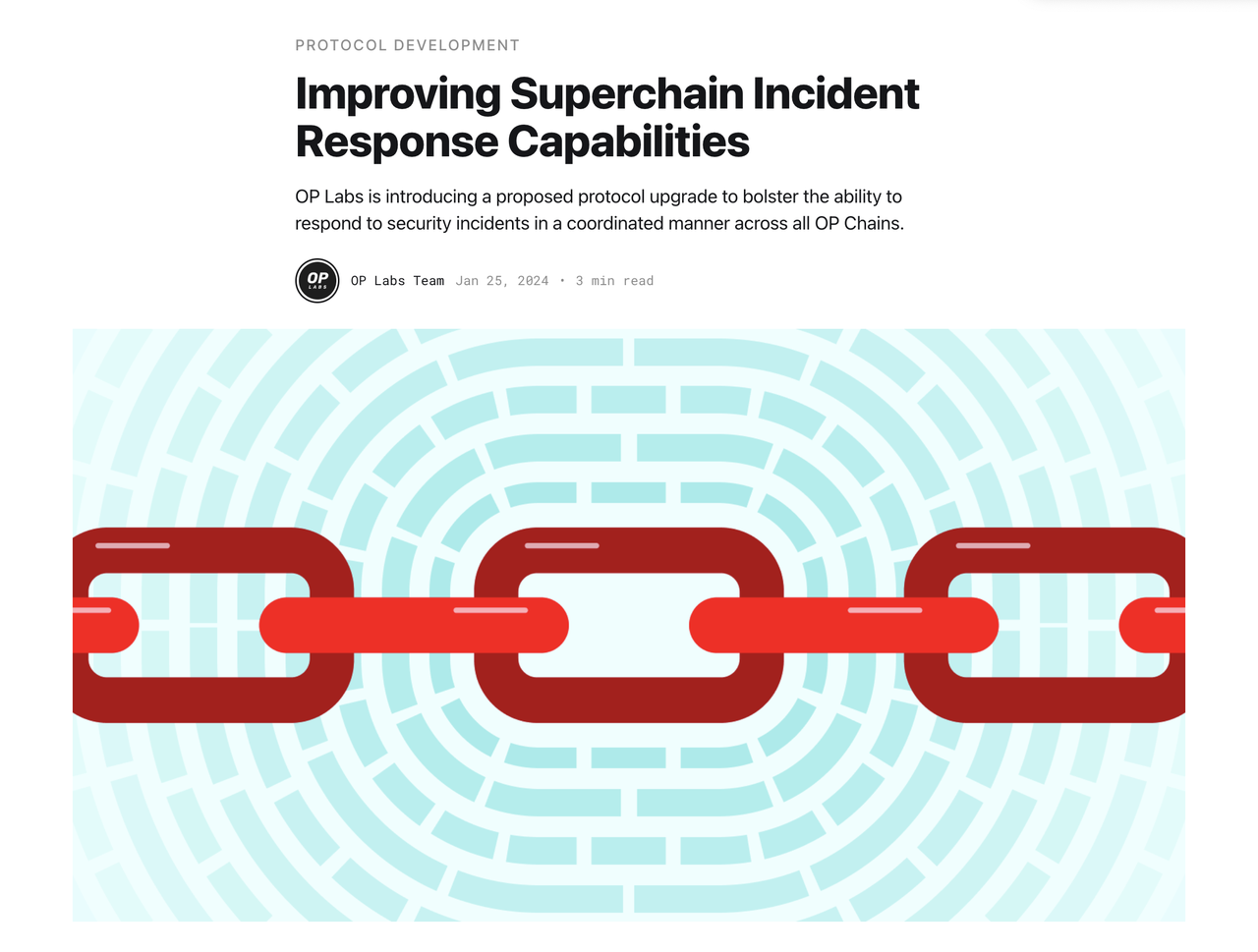
(Source: oplabs.io)
[Polygon] Polygon aims to launch 'AggLayer' focused on blockchain interoperability in February. Polygon Labs is set to launch a new solution called "AggLayer," designed to connect blockchains using zero-knowledge proofs. According to Polygon Labs, the first version of AggLayer is scheduled to be released in February. Its aim is to empower developers to connect blockchains to support unified liquidity. AggLayer will ensure the unified security of modular and holistic chains, including those within the Polygon ecosystem. It will be a key component of Polygon 2.0, the next generation iteration of the network. Unlike typical interoperability solutions, AggLayer will aggregate all connected chains' ZK proofs.
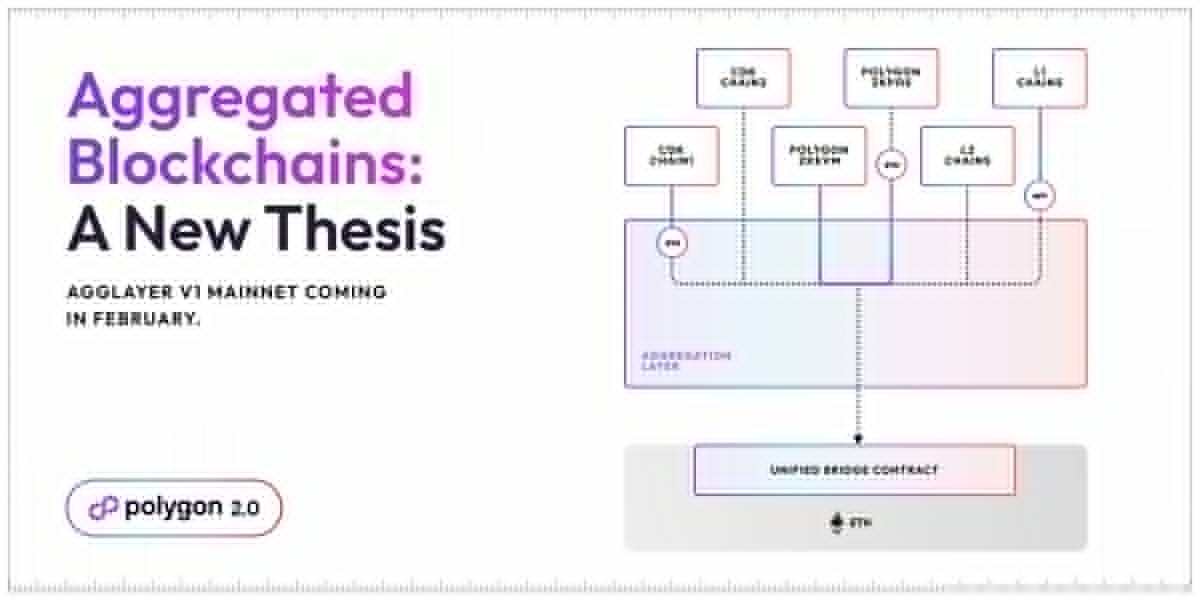
(Source: Twitter@0xPolygonLabs)
[Solana] Token Extensions Enable Native Support for Enterprise-Grade Use Cases. Solana has introduced a new generation of SPL token extensions, providing native support for enterprise use cases without relying on third parties. The new extensions include "Shielded Transfers" that protect the confidentiality of user balances and hide transaction amounts, "Token Hooks" that allow token issuers to control wallets interacting with their tokens, and "Transfer Fees" that enable fee collection at the protocol level. These extensions unlock possibilities for new business standards and use cases on the Solana blockchain. For instance, Shielded Transfers can be used for on-chain salaries, B2B payments, and financial management; Token Hooks for KYC verification, token access control, and royalty enforcement; and Transfer Fees for perpetual royalties, issuance fees, and transaction fees, among other applications.

(Source: solana.com)
[Sui] Sui Launching Beta Version of GraphQL RPC Service. According to the official announcement, to address many known issues with the existing RPC, Sui is preparing to launch a new RPC service based on GraphQL, named Sui RPC 2.0. GraphQL is an open-source query language for APIs and a runtime for executing those queries, designed to simplify the construction of expressive APIs and services that require complex data queries. Users can currently access a read-only snapshot of the Sui mainnet and testnet networks' Beta versions. This version serves as a sandbox for developers to become familiar with the upcoming GraphQL RPC schema and services.
In addition, Mysten Labs has announced a collaboration with Alibaba Cloud to introduce a series of new services to support current and new Move developers on Sui. These products include AI-supported development environments, cross-university educational programming, community activities, and translations of Move documentation into Mandarin and Korean.
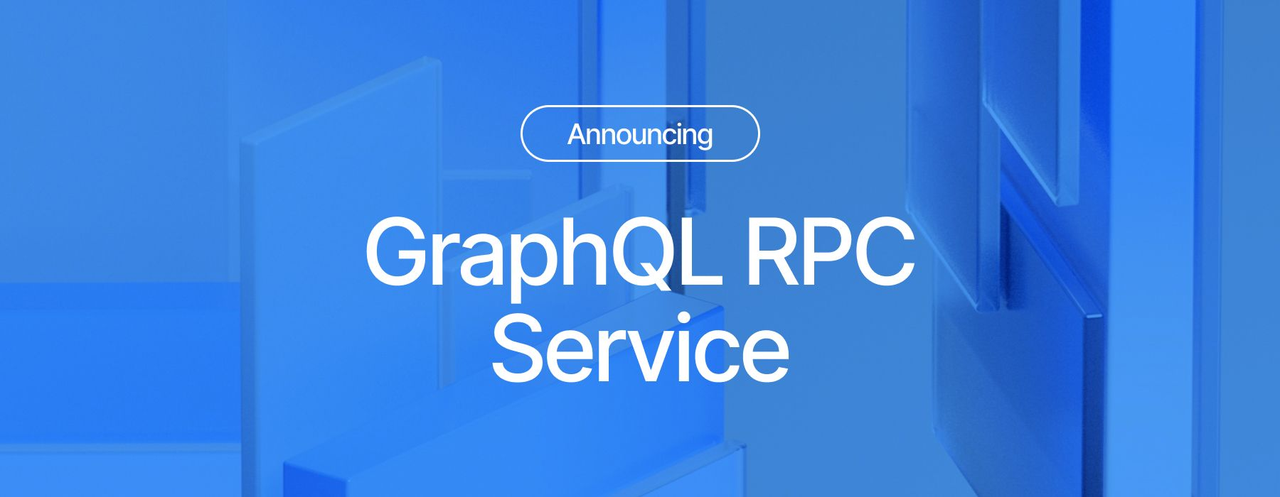
(Source: sui.io)
[Avalanche] Ava Labs outlines scaling solution Vryx in plan for Avalanche to reach 100,000 TPS. Ava Labs has released detailed information about its scaling solution called Vryx, designed to increase the transaction speed of the Avalanche (AVAX) blockchain to approximately 100,000 transactions per second. The company has already begun implementing this scaling solution and plans to establish benchmarks in the coming weeks. The scaling approach will be enabled on the first HyperSDK testnet, scheduled to launch in the mid-second quarter.
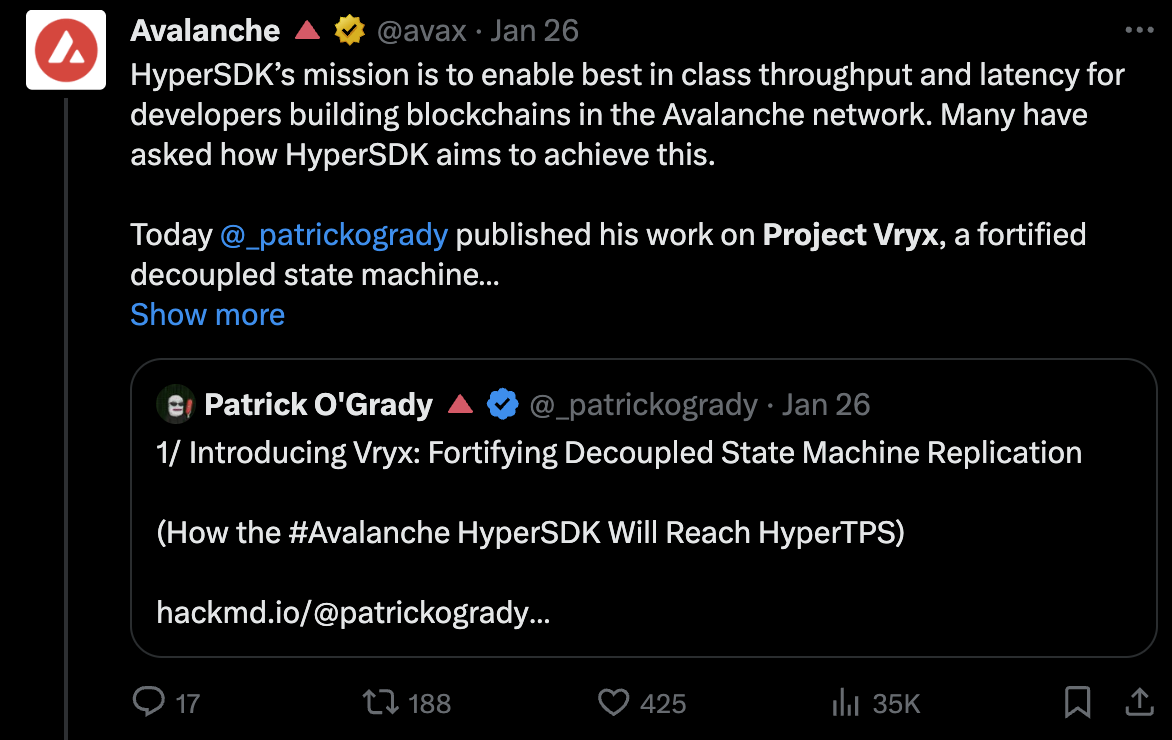
(Source: Twitter@avax)
4 Key Fundraising Data
Last week witnessed a total of 29 financing events, raising a substantial amount of over $156.6 million*. Compared to last week, financing activities remained active in both trading volume and total financing amount. The Service sector led with the highest number of 5 financing events. Simultaneously, the Service sector recorded the highest total financing amount, raising a total of $51 million, constituting 33% of the overall financing amount. The largest financing event was led by Sygnum, successfully securing $40 million in funding. Sygnum is a Digital Asset Bank with a foundation in Swiss and Singapore heritage, operating globally. More detailed information is provided below.
*8 events of unknown amount are included, which have been excluded from the remaining data.
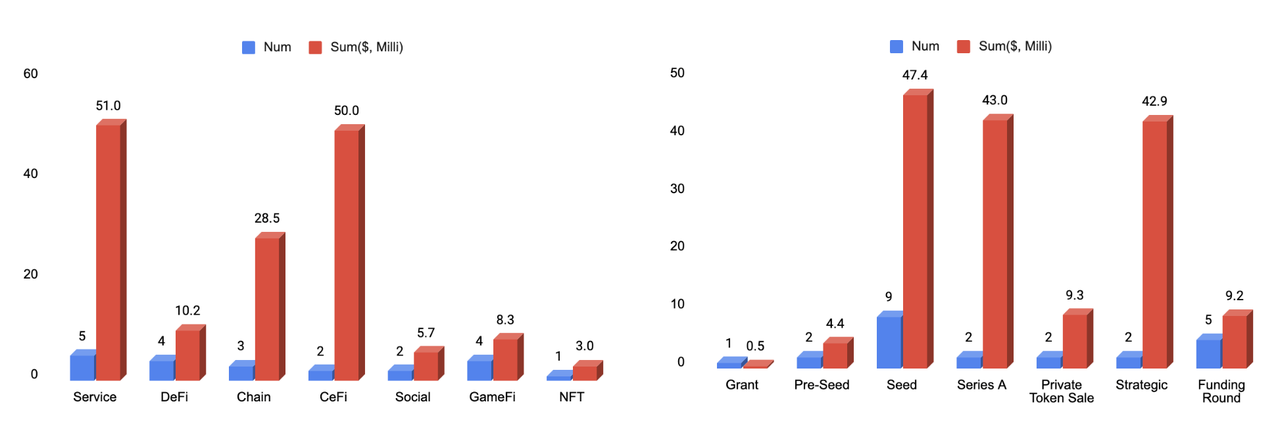

Top Left: Stats in Areas; Top Right: Stats in Rounds; Bottom: All Events
(Data: Cryptorank, Foresights, LBank Labs)
Below, we listed the most noteworthy fundraising deals for you:
1. [CeFi] Sygnum raises more than USD 40 million in interim close of oversubscribed financing round.
Global digital asset banking group Sygnum announced that it has raised more than USD 40 million against an initial ~USD 35 million target in an interim close to its latest funding round, which is named the Strategic Growth Round. As of the completion of this interim close the company’s post-money valuation stands at USD 900 million. Global asset management group Azimut Holding is the lead investor for the round and are joined by other new and existing strategic and financial investors. Consistent with prior fundraising rounds, the Strategic Growth Round also saw Sygnum employees participating as personal investors on the same terms. Sygnumers, together with the co-founders, board members and management team continue to hold majority ownership of the company.
Proceeds from this financing round will be used to expand Sygnum’s geographic reach into new markets and accelerate the development of Sygnum’s fully regulated products such as its B2B (bank-to-bank) platform, which now powers the crypto offering of over 15 banks and financial institutions globally.
• Official Link: https://www.sygnum.com/
2. [Service] Ingonyama has successfully raised $21 million in its Seed Funding round.
Innovative company Ingonyama, focused on accelerating and popularizing zero-knowledge proof (ZKP) technology, has successfully completed a $21 million seed funding round, with lead investments from IOSG Ventures, Geometry, and Walden Catalyst Ventures. IOSG Ventures is dedicated to supporting projects that demonstrate breakthroughs in ZK technology innovation and application development. They plan to establish a long-term partnership with Ingonyama, concentrating on the broader development of ZK technology.
Ingonyama is currently dedicated to enhancing the capabilities of zero-knowledge proofs (ZKP) through its product, ICICLE. ICICLE accelerates ZKP computations on GPUs, aiming to make ZKP faster, more accessible, and cost-effective. In the future, Ingonyama plans to continue developing and optimizing ZKP technology, expanding its application scope beyond the blockchain sector to cover industries that require high levels of privacy and security. Simultaneously, they aim to build a broader developer community to promote the widespread adoption and innovative applications of ZKP technology.
• Official Link: https://www.ingonyama.com/
3. [Chain] Polymer Labs has successfully raised $23 million in its Series A funding round.
The Ethereum Layer 2 development company secured the funding from a group of investors led by Blockchain Capital, Maven 11, and Distributed Global. Coinbase Ventures, Placeholder, Digital Currency Group, North Island Ventures, and Figment Capital also participated in the investment.
Polymer Labs is actively working on building an Ethereum Layer 2 network that provides interoperability services between Ethereum and its rollups. The company's current team consists of approximately 30 people, and it plans to utilize the new capital to expand its operations, including recruitment in business development and engineering. Polymer also aims to launch its mainnet sometime this year, contingent on the performance of the testnet. Leveraging the Inter-Blockchain Communication (IBC) protocol and the Optimism Stack, Polymer is constructing its interoperability hub. The company's ultimate goal is to connect Ethereum and its rollups initially and then expand to all blockchains, laying the foundation for the next generation of the internet.
• Official Link: https://www.polymerlabs.org/
4. [Service] Axiom has successfully raised $20 million in its Series A funding round.
Axiom, the historical data protocol for Ethereum, has announced the completion of a $20 million Series A funding round led by Paradigm and Standard Crypto. Other contributors to the funding round include Robot Ventures, Ethereal Ventures, Hasu from Flashbots, Sandy from Scroll, Alex from OpenSea, Sreeram and Calvin from EigenLabs, Liam from Optimism/ETH Global, Collin from Obol, Lakshman from Personae, Stephen and Jazzy from Zellic, Brendan and Daniel from Polygon, Zac and Joe from Aztec, and more.
The funds raised will be used to expand the team and accelerate the development of its core zero-knowledge (ZK) platform. This platform aims to empower smart contract developers to build data-rich on-chain applications. The announcement comes after Axiom's latest V2 upgrade, which focuses on making the protocol more useful for smart contract developers.
• Official Link: https://www.axiom.xyz/
See you next week!
Popularne glosariusze
Powiązane lektury
98888.95 | -3.35% | |
2183.69 | -8.52% | |
605.5 | -4.06% | |
129.07 | -6.14% | |
0.001638 | -8.29% | |
0.9996 | -0.01% | |
1.9636 | -5.24% | |
2.678 | -7.18% | |
2.3543 | -8.74% | |
0.2611 | -5.88% | |
3.147 | -6.06% | |
8.49 | -5.98% | |
0.2024 | -8.66% | |
0.000647 | -4.43% | |
0.000723 | -3.60% | |
0.000000978 | -4.02% | |
0.001548 | -1.65% | |
0.00956 | -25.14% | |
0.004799 | -0.17% | |
0.01438 | -21.63% | |
0.01294 | -10.70% | |
0.003777 | -19.09% | |
0.02993 | -6.20% | |
0.001204 | -40.66% | |
0.006370 | 4.67% | |
0.8335 | -25.31% | |
0.03360 | -3.14% | |
0.029382 | -36.93% | |
0.000972 | -27.79% | |
0.003430 | -43.58% | |
0.0001985 | 4.75% | |
0.0001 | 0.00% | |
0.9578 | 4.85% | |
0.0001856 | -8.03% | |
0.003564 | -5.21% | |
0.000851 | 27.40% | |
0.04170 | -3.58% | |
0.03737 | 16.82% | |
0.002893 | -10.79% | |
0.000772 | -43.48% | |
0.000027 | -3.57% | |
0.005225 | -18.90% | |
0.000784 | -4.16% | |
0.000765 | -33.36% | |
0.00819 | -5.21% | |
0.03757 | -9.67% | |
0.01820 | -8.91% | |
0.1554 | 10.29% | |
2109.1257 | 0.43% | |
51.688 | 0.90% | |
37.626 | 6.50% | |
0.00000074320 | 5.21% | |
0.0061512 | 0.03% | |
0.00003760 | 17.50% | |
0.150500 | 13.87% | |
0.02565 | -3.61% | |
0.13255 | -9.89% | |
92.30809 | 0.33% | |
0.000000105120 | -0.38% | |
696940.7024400 | 21.15% | |
27.556 | 1.16% | |
3580.0000 | 0.06% | |
0.00085108 | -6.12% | |
0.00000063267 | 2.61% | |
80.0301 | -0.04% | |
2.19605 | 0.54% | |
2.55946 | -6.98% | |
4.2524 | -11.12% | |
0.1214 | 5.84% | |
0.2970 | 53.57% | |
0.0000211 | -82.09% | |
8.443100 | 0.18% | |
0.081571 | 0.74% | |
0.08069 | -0.84% | |
0.00476690 | -0.46% | |
602.0000 | 1.18% | |
0.580045 | -5.37% | |
0.1149 | -7.34% | |
0.01283 | -6.62% | |
0.4552 | 1.25% | |
1.2031 | -0.09% | |
0.0000064 | -64.84% | |
0.009800 | 0.00% | |
2.0176 | 0.63% | |
0.025962 | -4.77% | |
258.3100 | -0.05% | |
0.1519 | 2.22% | |
4.1424 | 0.09% | |
0.0003812 | 0.45% | |
0.7297 | -9.47% | |
0.153263 | 0.55% | |
0.14738 | 0.01% | |
7002.00 | -5.39% | |
0.00400 | 0.00% | |
0.05537 | -5.30% | |
0.007314 | -3.22% | |
0.00813 | -11.34% | |
0.2056 | 1.63% | |
1.1309 | -3.09% | |
0.0010022 | -7.80% | |
5.1007 | -1.30% | |
0.00008122 | -18.38% | |
0.7059 | -0.03% | |
107.9008 | -0.09% | |
0.0918 | -2.55% | |
0.9104 | -1.01% | |
0.038709 | -0.52% | |
0.4218 | -1.40% | |
0.1755 | -1.24% | |
0.00387146 | -3.35% | |
0.01505 | 0.00% | |
0.001462 | -6.16% | |
0.02373 | -0.21% | |
0.00001944 | -10.78% | |
0.090000 | -1.10% | |
0.001469 | 1.17% | |
0.985 | 1.65% | |
0.05739 | -3.20% | |
0.01708 | 0.06% | |
0.00000860 | -9.47% | |
3.7838 | -3.42% | |
0.00034037 | -3.67% | |
0.04421 | -2.08% | |
2.2334 | -0.11% | |
0.0118 | 0.85% | |
0.000061202 | -5.91% | |
0.0023343 | -0.33% | |
0.0748 | -4.35% | |
0.00003033 | -12.32% | |
0.1479 | -0.67% | |
0.000000414 | 1.22% | |
0.000825 | -17.17% | |
0.00003734 | -0.35% | |
3.5002 | -7.75% | |
307.65 | -0.87% | |
0.000014166 | 0.13% | |
0.000156 | -40.23% | |
9.4224 | 0.11% | |
0.010812 | -6.79% | |
0.00002378 | -12.86% | |
0.001429 | -9.56% | |
0.03507 | -16.78% | |
0.0001200 | -0.08% | |
0.002208 | -15.66% | |
0.9752 | 0.04% | |
0.4191 | -7.95% | |
0.1732 | -2.04% | |
0.029588 | -1.69% | |
0.71351 | -0.11% | |
0.3603 | -0.06% | |
0.5251 | 7.80% | |
0.01196 | -5.68% | |
0.5321 | 3.10% | |
27.66137 | -2.07% | |
0.06124 | -5.89% | |
1.5525 | -1.93% | |
0.00001300 | 0.08% | |
0.132007 | -0.06% | |
0.0581 | -0.17% | |
0.1088 | -5.88% | |
0.013378 | -5.11% | |
0.7157 | -0.72% | |
0.005450 | -3.57% | |
0.000520 | 0.58% | |
0.00002568 | -18.40% | |
0.01940 | -8.92% | |
0.02742 | -2.77% | |
0.002282 | -9.01% | |
6.2146 | 0.85% | |
8.9814 | 0.00% | |
36.7908 | -4.38% | |
0.01957 | 0.72% | |
0.00004877 | 0.18% | |
0.01765 | -4.90% | |
0.179844 | 9.71% | |
0.5385 | 1.39% | |
0.3802 | -0.96% | |
2.5304 | -0.13% | |
0.002325 | -7.59% | |
0.014916 | 2.15% | |
0.5187 | -5.59% | |
0.000954 | -1.04% | |
0.024790 | -0.04% | |
0.17200 | -12.53% | |
0.07989 | 29.46% | |
1.3380 | -10.53% | |
0.000010644 | 0.96% | |
0.0614 | -1.76% | |
0.01027 | 5.88% | |
0.00000288 | -8.28% | |
0.2620 | -4.41% | |
3448.18 | 1.27% | |
0.00092613 | 9.64% | |
0.000729 | 0.41% | |
0.16502 | -2.68% | |
185.293 | 13.22% | |
1.6643 | -3.40% | |
0.14737 | -6.43% | |
0.083111 | -0.19% | |
20.8880 | -25.19% | |
0.4861 | -7.74% | |
0.159028 | -0.90% | |
0.7898 | 0.19% | |
0.00000000002479 | -8.12% | |
0.02782 | -0.22% | |
0.0003991 | 0.00% | |
46.731 | -13.58% | |
0.06512 | -0.56% | |
0.0856 | -2.95% | |
1.0747 | -3.35% | |
0.0011523 | 0.26% | |
1.0605 | 34.72% | |
0.00000324 | -16.06% | |
0.0663 | -4.47% | |
0.1207 | -6.80% | |
0.001027 | 0.20% | |
0.002491 | -12.41% | |
0.02538 | -2.61% | |
0.2417 | -1.51% | |
0.1978 | 4.05% | |
0.5243 | -7.22% | |
0.00001180 | -7.52% | |
0.003212 | -5.17% | |
0.9503 | 0.03% | |
0.00915 | 0.77% | |
0.00007368 | -8.15% | |
0.1954 | -0.10% | |
0.0000120000 | -7.69% | |
0.00004382 | 0.00% | |
0.002109 | -0.52% | |
0.002391 | 3.33% | |
0.0004748 | -4.45% | |
0.0003131 | 0.87% | |
182.100 | -4.01% | |
1.0721 | -6.72% | |
0.2514 | -4.92% | |
0.03449 | -5.89% | |
0.01929 | -1.73% | |
0.0004442 | 0.86% | |
0.003672 | -14.00% | |
0.010054 | -6.93% | |
0.0003804 | -4.37% | |
0.004524 | -18.81% | |
0.000000000993 | -7.37% | |
0.0000001423 | -0.63% | |
0.01467 | -10.60% | |
2.038 | -0.10% | |
0.002177 | -2.25% | |
0.0002198 | -0.18% | |
0.001513 | -11.93% | |
0.1875 | -8.85% | |
17.9376 | -0.20% | |
0.0980 | -0.51% | |
217.95 | -10.19% | |
0.00005684 | -2.34% | |
0.06073 | -2.36% | |
0.00174837 | -13.37% | |
0.00870 | 22.02% | |
0.00035615 | -1.89% | |
0.198854 | 1.91% | |
0.00199 | -7.44% | |
0.01626 | -10.46% | |
0.0207 | -9.21% | |
0.0008425 | -11.29% | |
0.004502 | -23.16% | |
0.2289 | -4.82% | |
0.000231 | -47.62% | |
0.18357 | -0.05% | |
0.0010372 | -0.12% | |
0.028140 | 1.38% | |
0.004617 | -5.33% | |
0.00450 | -7.98% | |
0.13426 | -3.37% | |
0.001714 | 1.78% | |
1.139 | -7.17% | |
0.000134 | 0.75% | |
0.0001901 | -8.39% | |
0.000639 | 0.16% | |
1.1204 | -0.12% | |
0.00402 | -7.80% | |
0.0001504 | -12.51% | |
0.000006962 | 0.49% | |
0.000161 | 24.81% | |
2.0018 | -17.51% | |
0.02878 | -13.91% | |
4.439 | -6.88% | |
0.00058 | 0.00% | |
3.8248 | -4.64% | |
0.001339 | -2.19% | |
2.043 | -8.51% | |
0.00055547 | -0.57% | |
0.003000 | 9.33% | |
0.00114 | -8.80% | |
0.00001029 | -5.86% | |
0.000214 | 2.88% | |
0.000005193 | 0.00% | |
0.00022301 | -6.54% | |
0.0733 | 0.27% | |
0.9991 | -0.06% | |
0.029012 | -14.42% | |
0.05143 | -15.13% | |
0.01001 | -6.80% | |
0.0000831 | 0.61% | |
0.002630 | 9.63% | |
0.00000000194 | 1.04% | |
0.009975 | -23.73% | |
5.0807 | -0.35% | |
0.00428 | 6.73% | |
0.7140 | -0.32% | |
0.654 | -6.70% | |
0.002378 | 0.17% | |
0.000672 | -19.42% | |
0.00004764 | -4.80% | |
0.07417 | -9.76% | |
0.00030167 | 1.10% | |
0.023850 | 9.31% | |
0.18414 | -2.83% | |
4.5310 | -3.98% | |
0.0000957 | -0.52% | |
0.000920 | 0.11% | |
0.00189 | 142.31% | |
0.006677 | -16.46% | |
0.4820 | -6.01% | |
0.08243 | 1.18% | |
0.62118 | -0.15% | |
0.000069 | 2.99% | |
0.000000008409 | 26.93% | |
1.4055 | 1.91% | |
0.00008099 | -36.89% | |
0.041707 | -3.69% | |
3.4939 | 49.93% | |
0.000819 | 0.24% | |
0.1173 | -2.49% | |
0.0113960 | 9.73% | |
0.0000395 | -3.42% | |
0.02933 | 0.27% | |
0.009805 | -22.75% | |
0.000621 | -71.89% | |
0.01909 | -8.35% | |
0.03330 | -14.09% | |
0.014088 | 5.92% | |
0.006403 | -0.11% | |
9.19 | -10.52% | |
0.000005210 | -13.44% | |
0.6380 | -7.80% | |
0.042500 | 19.63% | |
0.000000000890 | -1.44% | |
1.262 | -4.39% | |
0.02141 | 0.38% | |
0.000780 | -10.34% | |
1.964 | -6.83% | |
34.0546 | -0.25% | |
1.843 | -7.01% | |
0.004360 | -17.44% | |
0.077 | 8.45% | |
11.22 | -8.11% | |
0.02968 | -28.79% | |
0.01176 | 0.60% | |
0.1677 | -4.01% | |
0.02955 | 1.58% | |
0.9811 | -5.66% | |
0.0000977 | -2.30% | |
0.4384 | 0.55% | |
0.000630 | -17.11% | |
0.0003233 | 121.89% | |
0.008874 | 17.09% | |
33.64 | 5.59% | |
0.000189496 | -3.91% | |
0.001235 | -1.75% | |
0.00074191 | -9.82% | |
0.000122 | 0.00% | |
108.5175 | 0.11% | |
0.0000005500 | -7.70% | |
2.1111 | 0.00% | |
50.0000 | 12.39% | |
0.01756 | 1.86% | |
0.0604 | 0.00% | |
0.8070 | -19.78% | |
0.003398 | -8.46% | |
0.0815 | -15.72% | |
0.8091 | -3.67% | |
0.03501 | -9.63% | |
0.009317 | -7.43% | |
0.01061 | -7.58% | |
0.00000030 | 0.00% | |
0.08244 | -10.89% | |
0.376 | -8.07% | |
0.00548 | -15.43% | |
0.8761 | 0.00% | |
0.9937 | 5.10% | |
15.95 | -5.23% | |
0.00358 | -6.04% | |
0.1984 | -7.68% | |
0.000287 | 9.54% | |
0.562 | -8.32% | |
0.00423 | 0.24% | |
0.0081 | -4.71% | |
0.00005088 | -8.29% | |
0.000898 | -1.10% | |
0.000000000287 | -4.65% | |
0.004500 | -2.17% | |
1.6009 | -0.04% | |
1.46 | -2.67% | |
3.1936 | -1.78% | |
3466.00 | 0.17% | |
0.00637 | -21.94% | |
0.01470 | 6.75% | |
0.00000002842 | -16.21% | |
0.002089 | -5.65% | |
0.84330 | 0.73% | |
0.0017 | 0.00% | |
0.00431 | -0.46% | |
0.004274 | 3.24% | |
0.0000197 | -5.74% | |
0.2223 | -6.56% | |
0.445 | -9.92% | |
0.00000002440 | -2.44% | |
0.00962 | -5.69% | |
0.05875 | -5.09% | |
0.001302 | -14.45% | |
0.005099 | -8.67% | |
0.2284 | -10.22% | |
0.00000000400 | -0.50% | |
0.006218 | -2.51% | |
8.067 | -9.20% | |
113.5842 | 0.00% | |
0.004060 | -9.98% | |
0.00577 | -1.70% | |
0.01277 | -0.70% | |
0.008579 | -4.80% | |
0.002471 | 5.15% | |
0.4622 | 1.25% | |
0.0747 | -14.82% | |
0.02492 | -7.53% | |
0.00006103 | -8.86% | |
0.00000456 | 0.00% | |
0.000016790 | -5.29% | |
3.651 | -4.12% | |
0.000457 | 0.66% | |
0.00009900 | -19.04% | |
0.000639 | -3.91% | |
0.000293 | -84.58% | |
0.000490 | -0.41% | |
0.03818 | -6.21% | |
0.002990 | -9.53% | |
0.00051 | -13.56% | |
0.0000507 | 26.12% | |
0.00011900 | 8.18% | |
0.00544 | -9.63% | |
0.075569 | -3.36% | |
0.0002417 | -4.28% | |
0.000922 | 0.11% | |
444.6 | -5.44% | |
0.1168 | -2.18% | |
0.01509 | 0.27% | |
0.00023709 | -0.87% | |
0.00727 | -13.14% | |
4.100 | 13.83% | |
0.009181 | -0.52% | |
0.1730 | -5.72% | |
0.00000003282 | -5.28% | |
0.0033566 | -8.88% | |
12.63 | -5.82% | |
0.000108 | -8.47% | |
0.0031057 | -3.26% | |
0.001269 | -7.57% | |
0.002615 | -14.09% | |
0.2785 | 11.62% | |
0.000007090 | -3.14% | |
2.678 | -8.13% | |
0.010093 | -0.68% | |
0.00002928 | -21.73% | |
6.054 | -11.06% | |
292.7 | -6.84% | |
0.00035 | -31.37% | |
0.637 | -6.87% | |
0.0000007059 | -3.47% | |
0.2041 | -5.38% | |
0.001398 | -1.48% | |
0.00000010517 | -0.73% | |
78.17 | -3.58% | |
0.002730 | -5.54% | |
0.001881 | -23.13% | |
0.002577 | -3.59% | |
0.0000013320 | -7.05% | |
0.005624 | 28.90% | |
0.00081 | -6.90% | |
1.2984 | -6.08% | |
0.580 | -7.50% | |
14.7370 | 0.05% | |
0.6587 | -6.35% | |
0.0480 | -2.24% | |
0.00368 | -24.28% | |
3.2111 | 0.43% | |
0.003390 | 21.20% | |
0.00000209 | 7.73% | |
0.02633 | -0.30% | |
0.00003495 | 1.16% | |
0.9820 | -5.54% | |
0.00004544 | -1.96% | |
0.03150 | -5.58% | |
0.000545 | 9.00% | |
0.12955 | -6.38% | |
0.0993 | -3.87% | |
4.62 | -4.74% | |
0.000255 | -5.90% | |
1.762 | -5.17% | |
0.00232 | -1.69% | |
0.7242 | -5.01% | |
0.00212 | -0.47% | |
0.00186 | -5.58% | |
0.1662 | 5.52% | |
0.00003594 | -0.11% | |
0.007436 | 8.86% | |
0.02193 | -14.30% | |
0.00000304 | 0.00% | |
0.10400 | -11.77% | |
0.00001887 | 0.00% | |
0.1600 | -3.09% | |
0.14369 | 0.01% | |
0.001078 | -1.10% | |
0.473 | -9.39% | |
0.0172558 | 0.30% | |
0.0002558 | -14.56% | |
0.2435 | -5.44% | |
0.2267 | -6.28% | |
0.14510 | -4.22% | |
0.0015137 | -10.43% | |
0.2745 | -9.23% | |
0.1303 | -8.88% | |
0.350 | -5.91% | |
3.84 | -10.07% | |
0.09227 | -14.24% | |
0.001319 | -28.89% | |
0.00891 | 0.00% | |
0.001268 | -11.64% | |
0.01047 | 1.36% | |
0.00606 | -5.02% | |
0.000680 | -8.11% | |
0.007693 | 9.62% | |
11.79 | -7.60% | |
0.00533 | -14.45% | |
0.0003208 | -5.23% | |
0.00000003374 | -7.89% | |
0.1295 | -9.31% | |
0.03978 | -11.17% | |
4.2500 | -26.10% | |
0.201 | -5.19% | |
1.352 | -10.17% | |
5.423 | -6.58% | |
0.002025 | -10.32% | |
0.0427 | -7.58% | |
0.004656 | -14.77% | |
0.0800 | 4.99% | |
0.000603 | -43.27% | |
0.000679 | -27.15% | |
0.00004628 | -3.90% | |
0.0006220 | -32.79% | |
0.05286 | -10.15% | |
0.01401 | -0.21% | |
0.000000036164 | -7.41% | |
0.01210 | -8.19% | |
0.005873 | -9.66% | |
1674 | -7.05% | |
0.0929 | -37.06% | |
2.9983 | 3.39% | |
0.000000337 | -32.19% | |
0.03252 | -14.51% | |
0.09230 | -16.21% | |
0.591 | -6.04% | |
0.74116 | 0.00% | |
0.000245 | -3.54% | |
0.4275 | -8.20% | |
0.000692 | 22.26% | |
1.1505 | 0.00% | |
0.00067 | -19.28% | |
0.3949 | -8.63% | |
1.780 | -9.00% | |
0.004684 | -17.61% | |
4.71 | -5.99% | |
0.0467 | -6.04% | |
0.0040 | 0.00% | |
0.0615 | -8.35% | |
6.427 | -5.44% | |
0.0866 | -9.13% | |
0.005259 | 0.55% | |
0.015107 | -7.81% | |
3.3558 | -5.80% | |
0.0015 | 7.14% | |
0.0001085 | -9.66% | |
0.02601 | -11.08% | |
0.041320 | -17.43% | |
0.002666 | -6.26% | |
0.000438 | 0.92% | |
0.001334 | -13.09% | |
0.0109 | -8.40% | |
0.09533 | -7.54% | |
0.005005 | -28.50% | |
0.01349 | -3.71% | |
0.00014 | 0.00% | |
0.00789 | -7.50% | |
0.000084 | 5.00% | |
0.009833 | -3.28% | |
0.31840 | 2.19% | |
0.0000126 | -16.00% | |
0.002270 | 1.48% | |
0.000325 | 0.93% | |
0.0814 | -7.18% | |
0.000000119 | -1.65% | |
0.000088 | -20.00% | |
45.9343 | -2.27% | |
0.00002820 | -7.90% | |
0.4341 | -6.97% | |
0.01552 | -4.55% | |
0.3342 | -7.12% | |
0.000832 | -3.93% | |
0.001619 | 18.78% | |
0.1556 | -4.01% | |
0.003029 | -8.96% | |
0.01481 | -8.75% | |
0.00663 | -12.07% | |
0.001357 | -8.12% | |
16.65 | -5.67% | |
156.2700 | -6.04% | |
0.0321 | -4.46% | |
0.017028 | -10.19% | |
0.2010 | -19.05% | |
0.023967 | -27.43% | |
0.0000003237 | -5.49% | |
33.68 | -10.23% | |
0.00237 | -10.23% | |
0.00000000008965 | -8.64% | |
0.0000147 | -18.33% | |
0.000900 | -3.43% | |
0.02074 | -9.07% | |
0.0000000232 | -14.07% | |
0.0221 | -9.80% | |
0.30237 | -11.73% | |
0.00034 | -17.07% | |
0.07878 | -8.35% | |
0.0406 | -6.67% | |
0.2982 | -11.38% | |
0.9997 | 0.01% | |
6.65 | -6.73% | |
0.00007489 | -5.80% | |
0.01733 | -17.24% | |
0.001499 | -20.27% | |
0.03070 | -7.33% | |
0.00001719 | -4.98% | |
2.7358 | 4.58% | |
0.000706 | -21.90% | |
0.007488 | 24.47% | |
0.000001133 | -2.41% | |
0.01715 | -7.15% | |
0.02049 | -22.91% | |
0.0000190176 | -9.44% | |
0.000614 | -18.13% | |
0.00749 | -6.72% | |
0.819 | -5.54% | |
0.004164 | -15.02% | |
0.00707 | -6.48% | |
0.00926 | -21.99% | |
0.1507 | -7.49% | |
12.34 | -7.57% | |
0.0774 | -14.85% | |
0.001964 | 0.61% | |
14.07 | -7.19% | |
0.3985 | -3.93% | |
0.0683 | -5.66% | |
0.0671 | -4.28% | |
0.00002300 | -3.48% | |
0.0750 | -14.77% | |
0.0014039 | 9.47% | |
0.0001400 | -15.25% | |
0.02646 | 2.76% | |
0.2003 | -9.57% | |
0.000000002566 | -19.64% | |
0.0020500 | 3.02% | |
0.0000000000756 | -6.78% | |
0.7208 | -6.33% | |
0.001702 | 5.91% | |
0.000306 | -34.62% | |
0.01873 | -7.05% | |
0.001349 | -11.37% | |
0.027985 | -9.41% | |
0.01990 | -8.63% | |
0.8432 | -6.05% | |
0.14876 | -7.92% | |
0.00416 | -9.17% | |
0.001001 | 0.00% | |
4700.02 | -6.09% | |
0.8873 | -8.83% | |
0.521 | -8.60% | |
0.0606 | -6.48% | |
0.2138 | -7.20% | |
0.000765 | -22.73% | |
0.1115 | -7.78% | |
1.1021 | -1.11% | |
16.56 | -8.41% | |
0.00005087 | -7.79% | |
0.00212 | -24.01% | |
0.011640 | -20.39% | |
0.3232 | -7.60% | |
0.2581 | -8.70% | |
0.00538 | 0.37% | |
0.00003 | 0.00% | |
0.01554 | -5.47% | |
0.008270 | -3.99% | |
0.01435 | -7.24% | |
0.1321 | -8.26% | |
0.02150 | -12.71% | |
0.00002265 | -21.44% | |
0.002650 | -21.27% | |
0.001257 | -17.63% | |
0.01575 | -0.13% | |
0.008123 | 11.32% | |
0.007572 | -12.04% | |
0.0863 | -3.90% | |
0.07294 | 0.90% | |
4.88 | -6.33% | |
0.001469 | -4.98% | |
0.00001364 | -14.32% | |
0.01524 | -7.86% | |
0.000548 | -10.46% | |
0.003080 | -11.80% | |
0.003040 | -8.52% | |
0.0961 | -8.30% | |
0.000883 | 3.52% | |
0.0830 | -6.85% | |
0.0001151 | 4.07% | |
0.086975 | 4.93% | |
0.00176515 | -7.11% | |
0.02530 | -10.76% | |
0.01537 | -5.82% | |
0.002240 | -8.68% | |
0.00607 | -10.74% | |
0.4022 | -0.32% | |
0.491 | -6.65% | |
0.4374 | -16.11% | |
0.00004442 | -0.29% | |
0.01270 | -9.09% | |
0.00492 | -13.68% | |
0.2920 | 0.41% | |
0.0441 | -6.57% | |
0.001588 | -11.19% | |
0.006469 | 5.17% | |
1.975 | -7.49% | |
0.014219 | -5.28% | |
0.005605 | -2.23% | |
0.00000001016 | -5.58% | |
0.1428 | -6.54% | |
0.00626 | -7.26% | |
0.0379 | -8.23% | |
0.2253 | -6.01% | |
0.01446 | -8.60% | |
0.01509 | -11.24% | |
0.12254 | -4.30% | |
0.0000000350 | -4.37% | |
0.006329 | -18.50% | |
0.1106 | 26.83% | |
0.002243 | -3.44% | |
0.003154 | -1.84% | |
0.6705 | -1.83% | |
0.2484 | 2.01% | |
0.4725 | -3.47% | |
0.00002712 | -1.09% | |
0.0791 | -8.45% | |
0.0361 | -1.63% | |
0.0033 | -23.26% | |
0.10720 | -11.33% | |
0.0267 | -10.10% | |
0.0000000006263 | -11.53% | |
0.01218 | -11.80% | |
0.1109 | -2.63% | |
0.0015689 | 9.84% | |
1.523 | -7.70% | |
0.01724 | -3.58% | |
14.85 | -5.11% | |
0.02123 | -10.31% | |
2.0000 | 0.00% | |
0.000968 | -8.33% | |
0.02882 | -0.38% | |
0.0387 | -6.97% | |
6.58 | -6.53% | |
0.0115 | -22.30% | |
0.0418 | -12.92% | |
0.0331 | -10.30% | |
96.25 | -4.94% | |
0.0528 | -8.33% | |
0.04698 | 0.17% | |
0.001657 | -14.89% | |
0.0355 | -11.47% | |
0.001126 | -11.27% | |
0.03354 | -2.13% | |
0.001295 | -8.35% | |
0.0000085 | 1.19% | |
0.7114 | 3.84% | |
0.0196 | -5.31% | |
0.1465 | -7.34% | |
0.000804 | -8.11% | |
0.00416 | 4.79% | |
0.002872 | -5.21% | |
0.000064 | -4.48% | |
3.179 | -9.20% | |
0.005617 | -15.32% | |
0.5412 | -7.90% | |
13.9965 | -0.83% | |
0.3609 | 3.65% | |
0.014096 | -17.34% | |
0.07776 | 0.88% | |
0.0804 | -7.27% | |
0.0000000162 | -51.93% | |
0.1400 | -2.78% | |
0.00332 | -2.64% | |
0.00005317 | -7.39% | |
0.297 | -8.62% | |
0.000002303 | -12.50% | |
0.001507 | -4.98% | |
0.001683 | -13.25% | |
0.001552 | -17.80% | |
0.0000757 | 0.00% | |
0.00000530 | -6.85% | |
0.00359 | -6.99% | |
0.000110 | -23.08% | |
13.00 | -9.15% | |
0.00392 | -9.05% | |
0.000137 | -4.86% | |
0.3490 | -7.82% | |
0.04937 | -7.04% | |
0.01853 | -9.08% | |
2.3845 | -7.43% | |
0.1404 | -18.42% | |
0.00600 | 1.69% | |
0.0602 | -5.94% | |
1.033 | -8.50% | |
0.0748 | -1.84% | |
0.01141 | -6.70% | |
0.00053 | -20.90% | |
0.00007500 | -0.11% | |
0.3562 | -2.17% | |
0.00538 | -8.97% | |
2.123 | -5.85% | |
0.0001973 | 14.31% | |
0.2427 | -15.41% | |
0.0001298 | 28.90% | |
0.0692 | -6.61% | |
0.036497 | -3.73% | |
0.32515 | -1.99% | |
0.01159 | -6.61% | |
0.000477 | -11.67% | |
0.000905 | -6.99% | |
0.12353 | -5.30% | |
0.001202 | -0.91% | |
0.1373 | -8.53% | |
0.0226 | -7.38% | |
0.0632 | -8.93% | |
0.0714 | -7.63% | |
0.1857 | -4.57% | |
1.541 | -8.87% | |
0.001664 | 0.54% | |
0.0245 | -11.23% | |
0.01457 | -17.50% | |
0.06149 | 5.78% | |
0.00110 | 1.85% | |
0.0000000255 | -42.57% | |
0.0545 | -4.55% | |
0.000626 | -6.01% | |
0.003072 | -9.17% | |
0.000180 | -6.25% | |
0.0002582 | -13.79% | |
0.1360 | -13.21% | |
0.0278 | -7.95% | |
0.00860 | 0.00% | |
0.002340 | -14.44% | |
0.5096 | -9.53% | |
0.2166 | -6.84% | |
0.0056 | -20.00% | |
0.1267 | -7.32% | |
0.001447 | -10.68% | |
0.03179 | 7.69% | |
0.002083 | -9.67% | |
0.005363 | -8.87% | |
0.00431 | -4.01% | |
0.0916 | -15.34% | |
0.03469 | -0.06% | |
0.00418 | -10.49% | |
0.00393 | -15.12% | |
0.02884 | -6.97% | |
12.61 | -6.45% | |
0.00000000410 | -7.45% | |
0.00116 | -2.52% | |
0.003282 | -12.10% | |
0.01533 | -8.64% | |
0.002593 | -28.31% | |
0.0298 | -6.88% | |
0.00111 | -15.91% | |
0.01723 | 4.42% | |
0.01930 | -3.26% | |
0.0111 | -5.93% | |
87.74 | -3.54% | |
0.0505 | -9.01% | |
0.1190 | -8.53% | |
0.000033 | 10.00% | |
0.00000000000415 | -28.82% | |
0.1949 | 0.26% | |
9.20 | -4.76% | |
0.000901 | -0.22% | |
0.003107 | -12.85% | |
0.2440 | -7.26% | |
4.0000 | -6.98% | |
0.000425 | -21.30% | |
0.04610 | 1.56% | |
0.001988 | -14.16% | |
0.000041 | -14.58% | |
0.0165 | -26.01% | |
44.35 | -6.02% | |
0.536 | -7.90% | |
0.0994 | -7.96% | |
0.000746 | -7.44% | |
0.1439 | -5.20% | |
0.199 | -7.44% | |
0.002597 | -11.88% | |
0.0013296 | -9.81% | |
0.02067 | 0.54% | |
23.63 | -5.14% | |
0.00567 | -5.03% | |
0.0004098 | -11.68% | |
0.0000001714 | -1.21% | |
0.01931 | -7.25% | |
0.000001029 | 8.77% | |
0.02115 | -8.80% | |
0.00433 | -9.03% | |
0.02119 | 0.90% | |
0.404 | -7.97% | |
0.0541 | -7.36% | |
0.1604 | -8.40% | |
0.000906 | 0.67% | |
0.00001924 | -3.85% | |
0.1139 | -8.95% | |
0.000001535 | -6.97% | |
0.573 | -7.43% | |
0.0623 | -8.25% | |
0.002017 | -9.59% | |
0.003231 | -7.97% | |
0.001090 | -14.84% | |
0.00207 | -11.16% | |
0.1274 | 2.49% | |
0.06000 | 0.00% | |
0.798 | -7.53% | |
0.0896 | -14.75% | |
0.000162 | -5.81% | |
0.355 | -8.27% | |
0.0003261 | -4.57% | |
0.162 | -4.14% | |
0.03421 | -12.01% | |
0.000114 | -21.38% | |
0.03820 | -3.09% | |
0.00337 | 0.00% | |
0.06185 | -3.57% | |
0.0553 | -7.53% | |
0.2845 | -5.64% | |
0.01279 | -6.71% | |
2.3559 | -0.53% | |
7.767 | 2.20% | |
0.00002375 | -7.84% | |
0.1344 | -7.82% | |
0.0645 | -8.38% | |
0.00721 | -8.96% | |
1.1151 | -7.61% | |
0.3753 | 3.76% | |
0.4831 | -4.20% | |
0.0391 | -6.90% | |
0.01804 | -8.43% | |
0.471 | -1.88% | |
0.1142 | -6.85% | |
0.001078 | -9.18% | |
8.978 | 0.72% | |
0.0596 | -7.02% | |
9.31 | -10.14% | |
0.000000000003430 | -14.19% | |
0.001367 | -6.24% | |
0.0010 | -28.57% | |
0.001150 | -6.88% | |
0.00002 | 0.00% | |
0.04463 | -8.75% | |
0.0429 | -8.14% | |
0.00000000000038 | -2.56% | |
0.0000000000000601 | 3.62% | |
0.1067 | -17.29% | |
0.0742 | 0.00% | |
0.0726 | -4.97% | |
0.4453 | -9.82% | |
0.01945 | -6.54% | |
5.23 | -6.10% | |
0.0007006 | -19.87% | |
0.0017 | 0.00% | |
0.002451 | -6.88% | |
0.000201 | -7.80% | |
0.000104 | 28.40% | |
0.05939 | -5.40% | |
0.000000000209 | -5.43% | |
0.000000005 | 66.67% | |
0.0227 | -6.97% | |
0.0007 | 133.33% | |
0.2022 | -7.92% | |
2388.03 | -11.73% | |
0.0000346 | -3.89% | |
0.3831 | -8.55% | |
0.00634 | -0.47% | |
0.02335 | -1.02% | |
0.00020 | 0.00% | |
0.01900 | 0.00% | |
0.0991 | -10.72% | |
0.0001482 | -36.64% | |
0.0022 | 15.79% | |
0.01757 | -6.74% | |
0.00003107 | -25.55% | |
0.01823 | -7.04% | |
0.000557 | -11.16% | |
0.000003831 | -12.67% | |
0.02871 | -0.21% | |
0.00000000000206 | 0.49% | |
0.02964 | -5.18% | |
0.003037 | -17.36% | |
1.941 | -4.01% | |
0.00158 | -5.39% | |
0.0000001205 | 0.00% | |
0.0536 | -8.06% | |
0.000208 | -7.56% | |
0.01141 | -5.15% | |
0.00000248 | -20.00% | |
0.0000000040011 | 0.01% | |
0.00430 | -20.52% | |
0.000673 | -1.90% | |
0.05543 | -0.22% | |
0.000216 | 0.47% | |
0.001556 | -7.98% | |
0.1968 | -5.02% | |
0.000090299 | -3.16% | |
0.000210 | -4.11% | |
0.001856 | -4.62% | |
0.000730 | 150.00% | |
0.4372 | -10.50% | |
0.0004958 | 3.98% | |
0.000159 | -3.64% | |
0.0487 | -7.06% | |
0.00134 | -11.84% | |
0.07243 | -17.57% | |
0.000001672 | -4.46% | |
1.2277 | -5.55% | |
0.2814 | -11.03% | |
0.1565 | -6.90% | |
0.0040 | -14.89% | |
0.000424 | -0.24% | |
0.000000000793 | -0.25% | |
0.0206 | -0.48% | |
0.9975 | 0.00% | |
0.2154 | -8.46% | |
0.000339 | -4.78% | |
0.1033 | -0.19% | |
0.000075 | 400.00% | |
0.001282 | -19.98% | |
0.01409 | 0.00% | |
0.0085 | 4.94% | |
0.00000000001189 | 0.00% | |
0.001097 | -12.17% | |
0.000425 | -52.41% | |
0.000000000021 | -8.70% | |
0.00006499 | 48.72% | |
0.9981 | 1.17% | |
0.02204 | -8.09% | |
0.0040 | 90.48% | |
0.141 | 4.44% | |
0.2455 | -9.88% | |
0.9685 | 0.45% | |
0.00001733 | -10.21% | |
0.04485 | 0.00% | |
0.0000665 | 0.15% | |
0.000000840 | -14.46% | |
0.004697 | -12.66% | |
0.002777 | -9.98% | |
0.0001535 | -2.66% | |
0.00677 | -5.45% | |
1.39 | -2.11% | |
0.001289 | -13.89% | |
0.0088 | 0.00% | |
0.0000000067 | -1.47% | |
0.000000000021 | -4.55% | |
0.0281 | -7.87% | |
0.0000339 | -0.29% | |
0.0005 | 0.00% | |
0.00002 | -33.33% | |
0.0070 | -6.67% | |
1.1824 | -0.19% | |
0.001757 | -16.49% | |
0.000000001825 | -1.46% | |
0.002120 | 5.68% | |
0.0000000350 | -3.31% | |
0.000958 | -8.24% | |
0.00000000000619 | -8.57% | |
0.000597 | -24.24% | |
0.9900 | 0.00% | |
0.000855 | -26.10% | |
0.00000000000036 | -2.70% | |
0.0689 | 2.53% | |
0.000000031 | 0.00% | |
0.651 | -4.41% | |
0.00000000007327 | -6.17% | |
0.0500 | 0.00% | |
0.00000000001101 | 0.00% | |
0.000000000154 | 0.00% | |
0.000000001237 | 0.00% | |
0.3133 | -4.57% | |
0.00000000015800 | -0.92% | |
0.01900 | -23.94% | |
0.00000000000107 | 0.00% | |
0.02354 | -4.11% | |
0.00010002 | 0.00% | |
0.1715 | -18.91% | |
0.0155 | 1.31% | |
0.0000013 | 62.50% | |
0.0001000 | 30.21% | |
0.01009 | -8.85% | |
15.541 | -7.14% | |
0.00000000053 | -41.11% | |
0.00016 | 45.45% | |
0.000630 | -3.82% | |
0.00115 | -31.95% | |
0.000011 | 10.00% | |
0.911 | -8.63% | |
0.0009 | 200.00% | |
0.0004120 | 39.00% | |
0.000000003117 | 0.00% | |
0.00110 | 46.67% | |
0.001044 | 93.69% | |
0.000072 | 0.00% | |
0.01667 | -9.40% | |
0.0000106 | 3.92% | |
0.0114 | 50.00% | |
0.00008852 | 0.00% | |
0.00000000000011 | 0.00% | |
0.000077 | 5.48% | |
0.000060 | 7.14% | |
0.000089 | 18.67% | |
0.635 | -7.97% | |
0.00060 | -42.31% | |
0.2381 | 0.63% | |
0.0012 | 20.00% | |
0.00119 | 48.75% | |
0.0661 | 0.76% | |
0.0026 | 0.00% | |
0.04641 | 4.34% | |
0.04201 | -1.96% | |
1.747 | -7.96% | |
0.01322 | -3.92% | |
0.0478 | 0.00% | |
0.000430 | -19.32% | |
0.0813 | -8.03% | |
0.5815 | -5.03% | |
0.2381 | -5.78% | |
0.2302 | -7.10% | |
0.0420 | -9.48% | |
0.9967 | -7.62% | |
0.00538 | -3.24% | |
0.00251 | -8.39% | |
0.4965 | -0.76% | |
0.005300 | 0.00% | |
0.02082 | -8.56% | |
0.03294 | -2.80% | |
0.007541 | -2.70% | |
0.0801 | 0.00% | |
0.0400 | 3.36% | |
0.00767 | -10.92% | |
0.0000673 | -0.44% | |
0.001990 | -5.01% | |
0.1419 | -5.96% | |
58.5600 | 0.00% | |
1.1176 | -4.65% | |
0.0001644 | -5.03% | |
0.0276 | -9.80% | |
0.11986 | 0.57% | |
0.00492 | 4.46% | |
0.4606 | -9.88% | |
0.0441 | -12.15% | |
3.946 | -10.62% | |
0.01513 | -1.18% | |
0.01180 | -13.17% | |
0.1901 | -5.38% | |
0.002985 | -6.31% | |
0.0267 | 0.00% | |
0.03347 | -9.22% | |
0.004681 | -17.06% | |
0.001158 | -8.24% | |
0.001185 | -7.85% | |
0.0005221 | 0.00% | |
0.18931 | 1.83% | |
0.0007993 | 0.00% | |
5.053 | -4.37% | |
0.02332 | -8.80% | |
0.1383 | 1.69% | |
0.001472 | -10.73% | |
0.030581 | 2.56% | |
0.04263 | -0.51% | |
0.00307 | -7.25% | |
0.002872 | -1.91% | |
0.002574 | -1.30% | |
0.1151 | -3.92% | |
0.000812 | -5.80% | |
0.0002969 | 0.81% | |
0.001506 | -8.34% | |
0.001197 | -8.06% | |
0.00814 | -6.86% | |
0.00801 | -6.53% | |
0.02666 | -3.96% | |
0.004743 | -5.80% | |
0.0928 | -16.77% | |
0.138 | -10.97% | |
0.2507 | -4.86% | |
0.0001573 | 0.00% | |
0.1262 | 1.28% | |
0.008006 | -1.01% | |
0.06421 | -16.71% | |
0.4070 | -4.64% | |
0.805 | 2.29% | |
0.002276 | -0.61% | |
0.001184 | -10.64% | |
0.03410 | -5.15% | |
0.00349 | -20.86% | |
0.000025 | 0.00% | |
0.3687 | -7.76% | |
0.04269 | -4.24% | |
0.00390 | -2.26% | |
0.4786 | -1.77% | |
0.001575 | -18.98% | |
0.0155 | -7.74% | |
0.001014 | -3.61% | |
1.089 | -6.60% | |
0.02973 | -11.28% | |
0.004278 | -8.78% | |
0.03226 | -5.42% | |
0.06445 | 0.70% | |
0.0499 | -9.76% | |
0.10676 | -6.51% | |
0.3496 | 0.00% | |
0.00794 | -6.04% | |
0.603 | -6.80% | |
2.114 | 1.59% | |
0.006826 | -17.27% | |
0.001061 | -1.76% | |
0.00587 | -8.85% | |
0.04326 | -0.94% | |
0.0857 | -12.55% | |
0.011683 | -2.34% | |
0.001048 | -14.59% | |
0.00317 | -10.96% | |
0.21216 | 3.54% | |
0.02099 | -2.87% | |
0.001620 | -5.70% | |
0.0753 | -5.64% | |
0.001065 | -11.03% | |
0.03487 | 0.00% | |
0.0885 | -11.85% | |
0.00000284 | -6.27% | |
0.0959 | -10.21% | |
0.07284 | -4.41% | |
0.1829 | -1.56% | |
0.3771 | 0.00% | |
0.5732 | 0.00% | |
48.738 | -3.54% | |
1.035 | 0.19% | |
2.509 | -8.40% | |
0.03835 | -8.21% | |
0.000000016 | 0.00% | |
6.63 | -4.47% | |
0.0000351 | 0.00% | |
0.0764 | -6.37% | |
0.07036 | -6.37% | |
0.5371 | -8.75% | |
0.0290 | 0.00% | |
0.00004300 | 0.00% | |
0.000058 | 0.00% | |
0.874 | -1.80% | |
1.2001 | 0.00% | |
2.0000 | 0.00% | |
4.767 | -5.47% | |
0.000081 | 1.25% | |
0.0008 | 0.00% | |
0.4424 | 0.00% | |
0.0787 | -9.02% | |
0.0004080 | -7.78% | |
0.1875 | 5.93% | |
0.04252 | 0.00% | |
0.02690 | -6.34% | |
0.1386 | -8.45% | |
0.0071 | 0.00% | |
2.294 | -5.01% | |
0.1507 | -8.78% | |
0.0442 | -8.68% | |
0.0780 | -7.47% | |
0.1372 | -6.28% | |
0.000000001830 | -6.78% | |
0.00000005144 | 0.00% | |
0.7663 | 0.00% | |
0.1204 | 0.00% | |
1.676 | -9.75% | |
0.707 | -6.48% | |
0.002016 | 0.00% | |
0.002205 | 0.00% | |
0.000298 | 0.00% | |
0.000300 | 0.00% | |
0.00035 | 0.00% | |
27.1300 | 0.00% | |
0.0100 | 0.00% | |
0.0011 | 0.00% | |
0.009757 | 0.00% | |
0.00090 | 0.00% | |
0.002609 | 0.00% | |
0.0000138 | 0.00% | |
0.001798 | 1.07% | |
0.011092 | 0.00% | |
0.000862 | 0.00% | |
0.0150 | 0.00% | |
0.0000002593 | 0.00% | |
0.00001584 | 0.00% | |
0.0000001018 | 0.00% | |
0.00030000 | 0.00% | |
0.000029 | 0.00% | |
0.00009 | 0.00% | |
0.00006187 | 0.00% | |
0.001405 | 0.00% | |
0.000502 | 1.01% | |
0.001717 | 0.00% | |
0.0185 | -6.57% | |
0.0001 | 0.00% | |
0.0009 | 0.00% | |
0.00013045 | 0.00% | |
0.004298 | 0.00% | |
0.000900 | 0.00% | |
0.0000000106 | 0.00% | |
0.00002512 | 0.00% | |
0.00005 | 25.00% | |
0.000390 | 0.00% | |
0.0015 | 0.00% | |
0.00432 | 0.00% | |
0.000405 | 0.00% | |
-- | -- | |
0.00000001 | 0.00% | |
0.0000006808 | 11.48% | |
0.00023159 | 0.00% | |
0.001105 | 0.00% | |
1.6799 | 0.00% | |
0.00000000001814 | -0.71% | |
0.00000000002387 | 0.00% | |
0.00425 | 0.00% | |
0.000138 | 0.00% | |
0.0000397 | 0.00% | |
0.00000339 | 0.00% | |
0.001722 | 0.00% | |
0.00164 | 0.00% | |
0.021850 | 19.01% | |
0.05056 | 0.00% | |
0.00005044 | 0.00% | |
0.0000520 | 0.00% | |
0.000016 | 0.00% | |
0.002000 | 0.00% | |
0.009502 | 0.00% | |
0.0006 | 0.00% | |
0.0240 | 0.00% | |
0.001555 | 0.00% | |
0.0081 | 0.00% | |
0.015928 | 0.00% | |
0.9993 | 0.00% | |
0.00000152 | 0.00% | |
0.000363 | 0.00% | |
0.0072 | 0.00% | |
0.000075 | 0.00% | |
0.03520 | 0.00% | |
0.0786 | 0.00% | |
0.001240 | 0.00% | |
65.1101 | 0.00% | |
0.002255 | 0.00% | |
4.4021 | 0.00% | |
0.0745 | 0.00% | |
0.000136 | 0.00% | |
0.003169 | 0.00% | |
0.1757 | 0.00% | |
2.2869 | 0.00% | |
0.0071 | 0.00% | |
0.000000000500 | -50.00% | |
0.0002200 | 0.00% | |
0.1348 | 0.00% | |
0.08397 | 0.00% | |
0.0096 | 0.00% | |
0.000044 | 0.00% | |
10.7114 | 0.00% | |
0.000399 | 0.00% | |
0.6700 | 0.00% | |
0.00016 | 0.00% | |
0.01989 | 0.00% | |
0.0177 | 0.00% | |
0.2888 | 0.00% | |
0.00501 | 0.00% | |
0.01001 | 0.00% | |
0.0650 | 0.00% | |
0.00199 | 0.00% | |
0.010200 | 0.00% | |
0.0039 | 0.00% | |
0.88686 | 0.00% | |
0.013368 | 0.00% | |
0.06484 | 0.00% | |
0.00227 | 0.00% | |
0.1730 | 0.00% | |
0.0160 | 0.00% | |
0.00667 | 0.00% | |
0.000908 | 0.00% | |
0.04851 | 0.00% | |
0.00110 | 0.00% | |
0.000001000 | 0.00% | |
0.00227 | 0.00% | |
1.3120 | -1.35% | |
0.00291 | 0.00% | |
0.00290 | 0.00% | |
0.00869 | 0.00% | |
0.00955 | 0.00% | |
0.5135 | 0.00% | |
0.00465 | 0.00% | |
0.0023 | 0.00% | |
0.000003356 | 0.00% | |
0.00023810 | 0.00% | |
0.0000330 | -0.30% | |
0.0900 | 0.00% | |
0.05000 | 0.00% | |
0.00000908 | 0.00% | |
0.00475 | 0.00% | |
200.01 | 0.00% | |
0.01450 | 0.00% | |
0.0000000500 | 0.00% | |
0.000044 | 0.00% | |
0.0000750 | 0.00% | |
0.038168 | 0.00% | |
0.00458 | 0.00% | |
0.0203 | 0.00% | |
0.21356 | 0.00% | |
0.0012210 | 0.00% | |
0.0031402 | 0.00% | |
0.000030 | 0.00% | |
0.002548 | 0.00% | |
0.0000541800 | 0.00% | |
0.0497 | 0.00% | |
0.7000 | 0.00% | |
0.00186 | 0.00% | |
0.0000180 | 0.00% | |
0.000808 | 0.00% | |
1.5000 | 0.00% | |
0.00099 | 0.00% | |
0.000853 | 0.00% | |
0.0000485 | 0.00% | |
0.00000003432 | 0.00% | |
0.000810 | 0.00% | |
0.00080 | 0.00% | |
0.1431 | 1.27% | |
0.4801 | 0.00% | |
0.05031 | 0.00% | |
0.000103 | 0.00% | |
0.000060291 | 0.00% | |
0.00617 | 0.00% | |
0.9999 | 0.00% | |
0.0018000 | 0.00% | |
1.1417 | 0.00% | |
0.010354 | 0.99% | |
0.250 | 0.00% | |
0.5283 | -6.61% | |
0.1944 | -5.95% | |
0.003144 | 0.00% | |
0.0019 | 0.00% | |
0.4758 | 0.00% | |
0.01424 | 0.00% | |
0.02188 | -5.49% | |
0.000000000997 | 0.00% | |
0.00300 | 0.00% | |
3.69 | 0.00% | |
0.00445 | 0.00% | |
0.198 | -8.76% | |
1.028 | -5.25% | |
0.0293 | -0.34% | |
0.316 | -8.14% |


